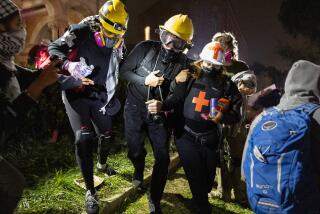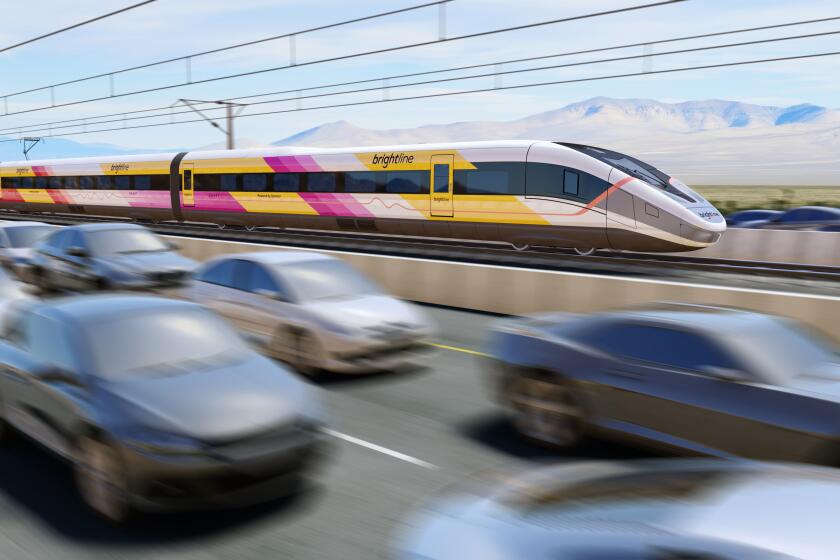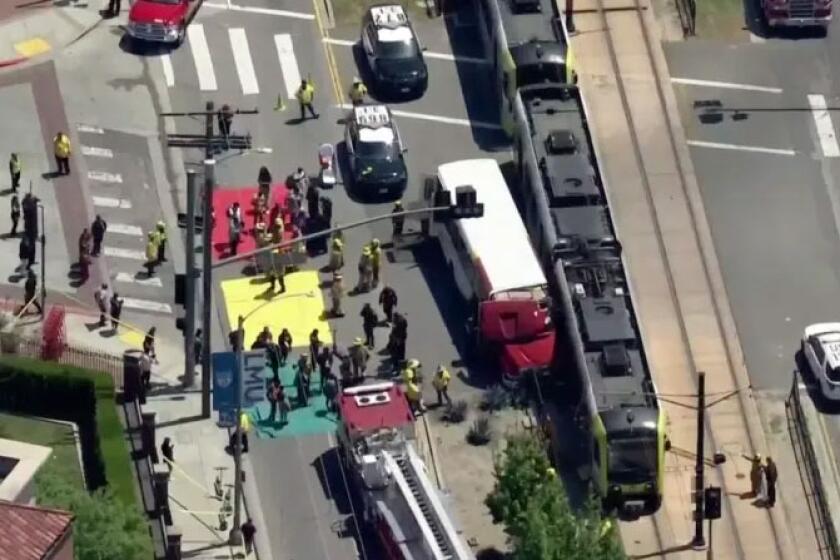Traffic Stops Are Just the Ticket, Police Say
Speeders beware: There’s a new sheriff in town.
In the nine months since Los Angeles Police Capt. Alan Kerstein took over the San Fernando Valley’s Traffic Division--the largest of the city’s four bureaus--officers have written 44% more tickets than they did in 1995, nabbing scofflaws at a pace that could reach 100,000 by year’s end.
On average, Valley traffic cops are writing a ticket every five minutes. During August, when most outdoor workers were trying to take it easy, traffic officers set an LAPD record, writing 8,595 tickets to Valley motorists.
Kerstein said the stepped-up enforcement is making the streets safer.
And that appears to be fulfilling the wish of many city residents who say they fear speeders as much as drug dealers and other criminals--even more than gangs--according to a recent survey commissioned by the LAPD.
Explaining why traffic enforcement has emerged as a top city concern, Kerstein said: “Statistically, not a lot of people have been held up or been victims of other crimes. But everybody’s been cut off. Everybody’s seen drunk drivers.”
The number of fatal accidents in the San Fernando Valley has dropped 22% from last year’s levels since the crackdown. Kerstein claims that is the result of preventive policing.
“There are about 100 souls still walking around the Valley because of our efforts,” he said. There have been 326 serious and fatal collisions in the Valley so far this year, compared with 426 for the same period in 1995.
Although the crackdown may be welcomed by most city residents, the police efforts do not draw much appreciation from the people lined up in Division 102 of Van Nuys Municipal Court, seeking to wiggle out of tickets or resigned to paying their fines. Many complain the ticket-writing boom is an excuse for the city to collect more fines--which can reach several hundred dollars for each offense.
*
“The bottom line is they make a killing,” said Ron Hedding, an Encino attorney who spent a recent morning in Van Nuys court. “It’s ridiculous. Whenever they need money, you’ll see them along the carpool lanes or hanging out at intersections.”
Kerstein denied his enforcement plan is an effort to pad city coffers.
“When an officer approaches a driver’s vehicle, he has absolutely no idea how much the ticket is. In fact, we aren’t aware in this office of how much money is changing hands,” he said.
Kerstein said he is instead hoping to change driving habits in the Valley. He even sounds parental in his belief that obeying traffic laws, like doing homework and making your bed, builds character.
Officers are encouraged to give warnings when possible, he said, knowing that being stopped by police is often enough to prompt marked improvement in a driver’s habits.
If you are caught, that doesn’t mean you aren’t deserving of courtesy.
“We don’t want to lose sight of the human element, both of the officer and the violator,” he said. A framed, hand-lettered sign on his office wall urges: “It’s nice to be important, but it’s more important to be nice.”
When Kerstein took over the Valley’s Traffic Division, he immediately demanded more tickets. He believes the division’s officers had previously been spending too much time responding to accidents and not enough time preventing them.
Kerstein changed patrols so that equal numbers of officers are on the streets day and night.
Previously, most worked during the day. He also reviewed accident records to find streets where accidents are more likely to occur, such as Roscoe Boulevard and Balboa and DeSoto avenues.
Although proud of the increase in the number of tickets issued, Kerstein tried to dispel the image of unfair police speed traps set up to meet monthly quotas.
“We’re not hiding on some side street wearing camouflage paint with a bush in front of our face, waiting for someone to roll through a stop sign at 1 mph,” Kerstein said.
Traffic consultant Gary Hamrick, whose Los Angeles firm, Meyer, Mohaddes Associates, works with communities to solve traffic safety problems, agreed more tickets can mean safer streets.
“The law-abiding driver wants to see enforcement,” he said. “I can’t see a downside to stricter supervision. When people start to think they’re being monitored, it becomes sort of a self-policing situation.”
But James Baxter, who advocates drivers’ interests as president of the private National Motorists Assn., doesn’t buy that logic.
“There is no correlation,” he said. “Intensive enforcement will frequently be accompanied by an increase in the amount of accidents.
“Enforcement can have a positive effect, but it’s not related to the number of tickets issued.”
Sheryl Gilbert of Northridge has learned firsthand that tickets are expensive and time-consuming.
“They put you through a lot so you won’t break the law,” she said, waiting in line at Van Nuys traffic court, where she spent a recent morning. “Why would they make it easy?”
Gilbert said, however, that sometimes drivers are pressured to break the law.
“I don’t think people think about speeding when they’re late picking up their child, or when their boss says, ‘If you’re late again, you’re fired,’ ” she said. “People speed.”
Nearby, a Burbank man, who would not give his name, seemed chastened by his court experience. “I have to say I’m driving a lot more cautiously now,” he said.
The man appears to support Kerstein’s belief that driving habits can be changed through enforcement. He said officers are instructed in “selling the ticket,” showing drivers how they broke the law.
*
That way, fewer drivers will contest the citation, he said. Besides, any burden on the court system or other areas of the government is not a concern, he said, because most violators plead guilty and pay by mail.
But some still wonder if it’s all worth it.
“A lot of the [ticketed] behavior may not be dangerous behavior,” said Baxter of the motorists’ group, citing numerous traffic studies. “It might simply be offensive to neighborhood residents, but it’s not what’s causing the accidents.”
Many residents mistakenly believe speeders are intruders to the neighborhood, said Baxter. “It turns out it’s the guy next door getting the ticket. People who think this is the right thing to do change their mind when they and their neighbors start getting caught.”
Kerstein recalled several times when residents called him to demand more patrols on their street, only to end up the ones who got pulled over.
For the most part, he said, “we get positive responses from people when we’re out on the streets. People drive by and give us a thumbs up.”
With a chuckle, he added: “At least I think that’s a thumbs up.”
More to Read
Start your day right
Sign up for Essential California for news, features and recommendations from the L.A. Times and beyond in your inbox six days a week.
You may occasionally receive promotional content from the Los Angeles Times.






